Garden Maintenance in Hackney
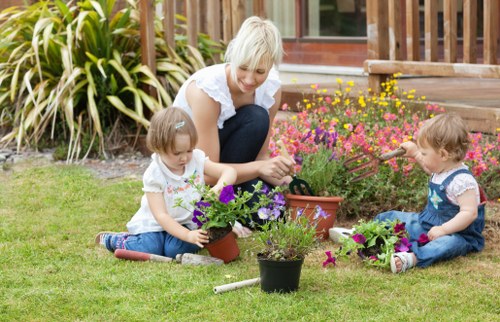
Maintaining a beautiful garden in Hackney requires dedication, knowledge, and the right strategies tailored to the unique climate and soil conditions of the area. Whether you're a seasoned gardener or a beginner, understanding the essential aspects of garden maintenance can help your outdoor space thrive all year round.
Hackney's urban environment presents both challenges and opportunities for gardeners. Limited space, varying sunlight exposure, and the local flora are factors that influence how you approach your garden maintenance. By adopting best practices and utilizing local resources, you can create a lush, vibrant garden even in the heart of the city.
Regular maintenance not only enhances the aesthetic appeal of your garden but also promotes the health and growth of your plants. From pruning and weeding to soil management and pest control, each task plays a crucial role in sustaining a thriving garden ecosystem.
The Importance of Regular Garden Maintenance
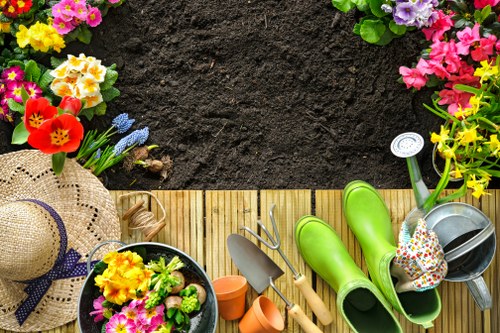
Regular garden maintenance is essential for several reasons. Firstly, it ensures that your plants receive the necessary care to grow strong and healthy. This includes providing adequate water, nutrients, and protection from pests and diseases.
Secondly, maintaining your garden helps prevent issues such as overgrowth, which can lead to blocked pathways and reduced access to sunlight for your plants. Regular pruning and trimming keep plants in check and promote better air circulation, reducing the risk of fungal infections.
Moreover, a well-maintained garden enhances the overall beauty and value of your property. It creates a welcoming environment for visitors and can significantly improve the curb appeal of your home, making it a pleasant space for relaxation and enjoyment.
Key Benefits of Consistent Garden Care
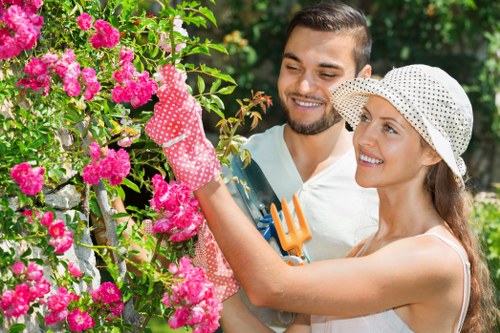
Consistent garden care offers numerous benefits, including:
- Enhanced Plant Health: Regular watering, feeding, and pest control keep plants healthy and vigorous.
- Improved Aesthetics: Pruning and weeding maintain the garden's appearance, making it more attractive.
- Increased Property Value: A well-kept garden can boost the market value of your home.
- Environmental Benefits: Gardens contribute to biodiversity, improve air quality, and support local ecosystems.
Emphasizing consistent care ensures that these benefits are realized, making your garden a valuable asset to your home and community.
Seasonal Garden Maintenance Tips
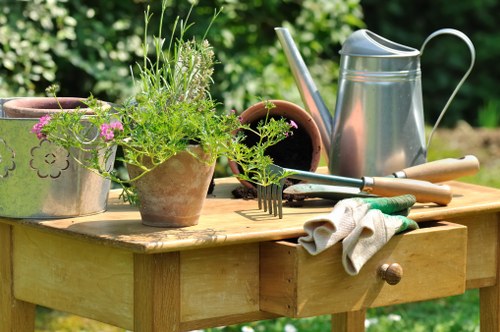
Different seasons bring unique challenges and opportunities for garden maintenance. Adapting your strategies to the changing weather conditions can help your garden flourish throughout the year.
Spring: Spring is the ideal time for planting new flowers and vegetables. It's also a good season for pruning shrubs and trees to encourage healthy growth.
Summer: During the hot months, ensure plants receive sufficient water. Mulching can help retain soil moisture and regulate temperature. Regular weeding is essential to prevent competition for nutrients.
Autumn and Winter Care
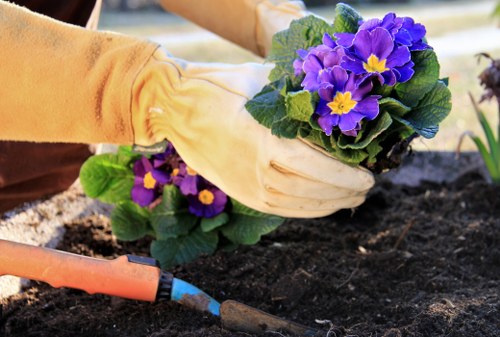
In autumn, focus on harvesting remaining crops and preparing the garden for the colder months. This includes clearing fallen leaves and protecting sensitive plants from frost.
Winter maintenance involves safeguarding your garden by covering plants, storing garden tools properly, and planning for the next growing season. It's also an excellent time to assess your garden's layout and make any necessary adjustments.
Essential Tools for Garden Maintenance
Having the right tools is crucial for effective garden maintenance. Some must-have tools include:
- Pruning Shears: For trimming and shaping plants.
- Garden Fork: Useful for aerating soil and turning compost.
- Watering Can: Essential for providing adequate moisture to your plants.
- Weeder: Helps in removing unwanted plants without disturbing the soil too much.
- Gloves: Protect your hands from thorns, dirt, and potential allergens.
Investing in quality tools can make maintenance tasks easier and more efficient, allowing you to spend more time enjoying your garden.
Choosing the Right Tools for Your Garden
Selecting appropriate tools depends on the size and type of your garden. For larger spaces, consider ergonomic tools that reduce strain. For smaller gardens or urban settings in Hackney, compact and multifunctional tools might be more suitable.
Pest and Disease Management
Effective pest and disease management is vital for maintaining a healthy garden. Regular inspection of plants helps in early detection of issues, allowing for prompt intervention.
Implementing integrated pest management (IPM) strategies can minimize the use of harmful chemicals. This includes using natural predators, organic pesticides, and cultural practices like crop rotation.
Maintaining plant health through proper watering, fertilization, and pruning also makes plants more resilient against pests and diseases, reducing the need for extensive treatments.
Organic Solutions for a Healthier Garden
Opting for organic solutions promotes a healthier garden ecosystem. Using compost as a natural fertilizer enriches the soil without introducing harmful substances. Additionally, planting companion plants can deter pests naturally and enhance plant growth.
Soil Management and Fertilization
Healthy soil is the foundation of a thriving garden. Regularly testing soil pH and nutrient levels helps in determining the appropriate amendments needed for optimal plant growth.
Incorporating organic matter like compost or well-rotted manure improves soil structure, enhances moisture retention, and provides essential nutrients to plants.
Proper mulching techniques also contribute to soil health by reducing erosion, suppressing weeds, and maintaining consistent soil temperature.
Improving Soil Quality
To improve soil quality, consider the following practices:
- Add organic compost to enrich the soil.
- Use cover crops to prevent soil erosion and enhance fertility.
- Rotate crops annually to disrupt pest cycles and maintain nutrient balance.
- Incorporate green manure to add fresh organic material.
Implementing these techniques fosters a robust soil environment that supports healthy plant growth.
Watering Strategies for Optimal Growth
Proper watering is crucial for plant health. Overwatering can lead to root rot and other fungal diseases, while underwatering can stress plants and inhibit growth.
Implementing efficient watering strategies, such as drip irrigation or soaker hoses, ensures that plants receive the right amount of moisture directly to their roots, minimizing waste and evaporation.
It's also important to water plants at the appropriate times of day, preferably in the early morning or late evening, to reduce water loss and prevent fungal growth.
Rainwater Harvesting and Conservation
Harvesting rainwater is an eco-friendly way to conserve water for your garden. Installing rain barrels or cisterns allows you to collect and store rainwater, reducing reliance on municipal water supplies.
Landscape Design and Planning
Thoughtful landscape design enhances both the functionality and beauty of your garden. Planning involves selecting appropriate plants, considering their growth habits, and arranging them to complement each other.
In Hackney, where space can be limited, vertical gardening or container gardening are effective methods to maximize plant variety and garden space.
Incorporating hardscaping elements like pathways, seating areas, and garden art can add structure and visual interest to your outdoor space.
Utilizing Native Plants
Choosing native plants is advantageous as they are well-adapted to the local climate and soil conditions, making them more resilient and easier to maintain. Native flora also support local wildlife, promoting biodiversity in your garden.
Professional Garden Maintenance Services
While DIY garden maintenance is rewarding, enlisting professional services can save time and ensure expert care. Professional gardeners in Hackney are equipped with the knowledge and tools to handle complex maintenance tasks efficiently.
Services may include regular mowing, pruning, pest control, soil testing, and landscape design. Hiring professionals allows you to enjoy a beautiful garden without the hassle of routine upkeep.
Moreover, professionals can provide personalized advice and solutions tailored to your garden's specific needs, ensuring optimal growth and aesthetics.
Choosing the Right Garden Maintenance Service
When selecting a garden maintenance service in Hackney, consider factors such as experience, reputation, and the range of services offered. Reading reviews, seeking recommendations, and conducting interviews can help you find a reliable and skilled gardener.
Eco-Friendly Gardening Practices
Adopting eco-friendly practices contributes to a sustainable environment and a healthier garden. This includes using organic fertilizers, minimizing chemical pesticide use, and promoting biodiversity through the use of native plants and companion planting.
Composting kitchen and garden waste reduces landfill contributions and provides a rich source of nutrients for your garden. Additionally, conserving water through rainwater harvesting and efficient irrigation systems supports environmental sustainability.
Implementing these practices not only benefits the environment but also creates a thriving garden ecosystem that is resilient and self-sustaining.
Reducing Carbon Footprint in Your Garden
Reducing your garden's carbon footprint can be achieved by using sustainable materials, recycling garden waste, and choosing energy-efficient tools. Planting trees and plants that sequester carbon also contributes to lowering atmospheric CO2 levels.
Common Garden Problems and Solutions
Gardeners in Hackney may encounter various challenges, such as pests, diseases, soil deficiencies, and adverse weather conditions. Identifying these problems early and applying appropriate solutions is key to maintaining a healthy garden.
For example, dealing with common pests like aphids and slugs can be managed through natural predators, traps, or organic insecticides. Addressing soil deficiencies involves regular testing and amendments to ensure optimal nutrient levels.
Adapting to weather changes, such as sudden frosts or heavy rains, requires flexible gardening practices and protective measures to safeguard plants.
Troubleshooting Common Issues
Effective troubleshooting involves:
- Regular monitoring of plant health and garden conditions.
- Maintaining detailed records of plant care and any issues encountered.
- Researching and implementing best practices for specific problems.
Proactive management helps in mitigating issues before they escalate, ensuring a robust and resilient garden.
Enhancing Garden Aesthetics
Enhancing the aesthetics of your garden involves thoughtful design and selection of plants, colors, and structures. Combining various textures, heights, and colors can create a visually appealing and balanced landscape.
Incorporating elements like paths, water features, and garden art adds character and interest to your outdoor space. Lighting can also play a significant role in highlighting garden features and extending enjoyment into the evening hours.
Regularly updating the garden layout and plant arrangements keeps the space dynamic and engaging, reflecting your personal style and preferences.
Incorporating Hardscaping Elements
Hardscaping elements such as patios, decks, pergolas, and retaining walls provide structure and functionality to your garden. They offer areas for relaxation, dining, and entertainment, enhancing the overall usability of your outdoor space.
Maintaining Garden Health Through Proper Pruning
Pruning is a critical aspect of garden maintenance that promotes plant health and encourages vigorous growth. It involves removing dead or diseased branches, shaping plants, and controlling their size.
Proper pruning techniques vary depending on the plant species and growth habits. It's essential to understand the specific requirements of each plant to avoid causing damage or inhibiting growth.
Regular pruning also improves air circulation within the plant canopy, reducing the likelihood of fungal infections and other diseases.
Pruning Tools and Techniques
Using the right tools, such as sharp pruners, loppers, and saws, ensures clean cuts and minimizes stress to the plants. Techniques like thinning, heading, and shaping should be employed based on the desired outcome for each plant.
Soil Health and Composting
Soil health is fundamental to plant growth. Incorporating compost into your garden soil enriches it with essential nutrients, improves soil structure, and enhances moisture retention.
Composting is an eco-friendly way to recycle organic waste, such as kitchen scraps and garden trimmings. A well-maintained compost heap produces a rich, dark material that can be used to fertilize and condition garden soil.
Regularly adding compost to your garden promotes a healthy soil ecosystem, supporting beneficial microorganisms and earthworms that contribute to soil fertility.
Starting Your Own Compost
Starting a compost pile involves combining green materials (like vegetable scraps and grass clippings) with brown materials (such as dried leaves and cardboard) in a balanced ratio. Maintaining moisture and turning the pile regularly accelerates decomposition and produces high-quality compost for your garden.
Water Management and Irrigation Systems
Effective water management ensures that your garden receives adequate moisture without wastage. Installing irrigation systems like drip irrigation or soaker hoses provides targeted watering, reducing evaporation and water runoff.
Automated irrigation systems with timers can help maintain consistent watering schedules, especially during busy periods or extended absences.
Implementing rainwater harvesting systems also contributes to sustainable water use, allowing you to utilize natural rainfall for your garden's needs.
Optimizing Irrigation Efficiency
To optimize irrigation efficiency:
- Group plants with similar water requirements together.
- Use mulch to retain soil moisture and reduce evaporation.
- Check and maintain irrigation systems regularly to prevent leaks and ensure even water distribution.
These practices help in conserving water and promoting healthy plant growth.
Choosing the Right Plants for Hackney Gardens
Selecting suitable plants for your Hackney garden involves considering factors like climate, soil type, sunlight exposure, and space constraints. Opting for native and adaptable species ensures better resilience and easier maintenance.
Incorporating a mix of perennials, annuals, shrubs, and trees can create a diverse and sustainable garden ecosystem. Additionally, choosing plants with varying blooming seasons ensures year-round color and interest.
Container gardening is also a practical solution for limited spaces, allowing you to grow a variety of plants without the need for extensive ground space.
Balcony and Urban Gardening Solutions
For urban gardeners in Hackney with limited outdoor space, balcony and rooftop gardening offer creative solutions. Utilizing vertical planters, hanging baskets, and compact containers maximizes planting space and enables you to cultivate a thriving garden in small areas.
Maintaining Garden Paths and Structures
Garden paths and structures like pergolas, gazebos, and fences add functionality and charm to your garden. Regular maintenance of these elements ensures their longevity and safety.
Clearing debris, repairing damaged sections, and applying protective coatings can extend the life of garden structures. Additionally, maintaining clear and well-kept paths enhances accessibility and the overall aesthetic appeal of your garden.
Incorporating lighting along paths and structures not only highlights garden features but also provides safety during evening hours.
DIY vs. Professional Maintenance
Deciding between DIY maintenance and hiring professionals depends on your garden's complexity and your personal expertise. While simple tasks like weeding and watering can be managed independently, more intricate maintenance like structural repairs or advanced landscaping may require professional assistance.
Conclusion
Effective garden maintenance in Hackney involves a combination of regular care, informed strategies, and the right resources. By understanding the unique aspects of urban gardening and implementing best practices, you can cultivate a beautiful and thriving garden space.
Whether you choose to maintain your garden yourself or seek professional services, prioritizing the health and aesthetics of your garden ensures it remains a cherished and vibrant part of your home.
Contact us today to learn more about our expert garden maintenance services and transform your Hackney garden into a stunning oasis.